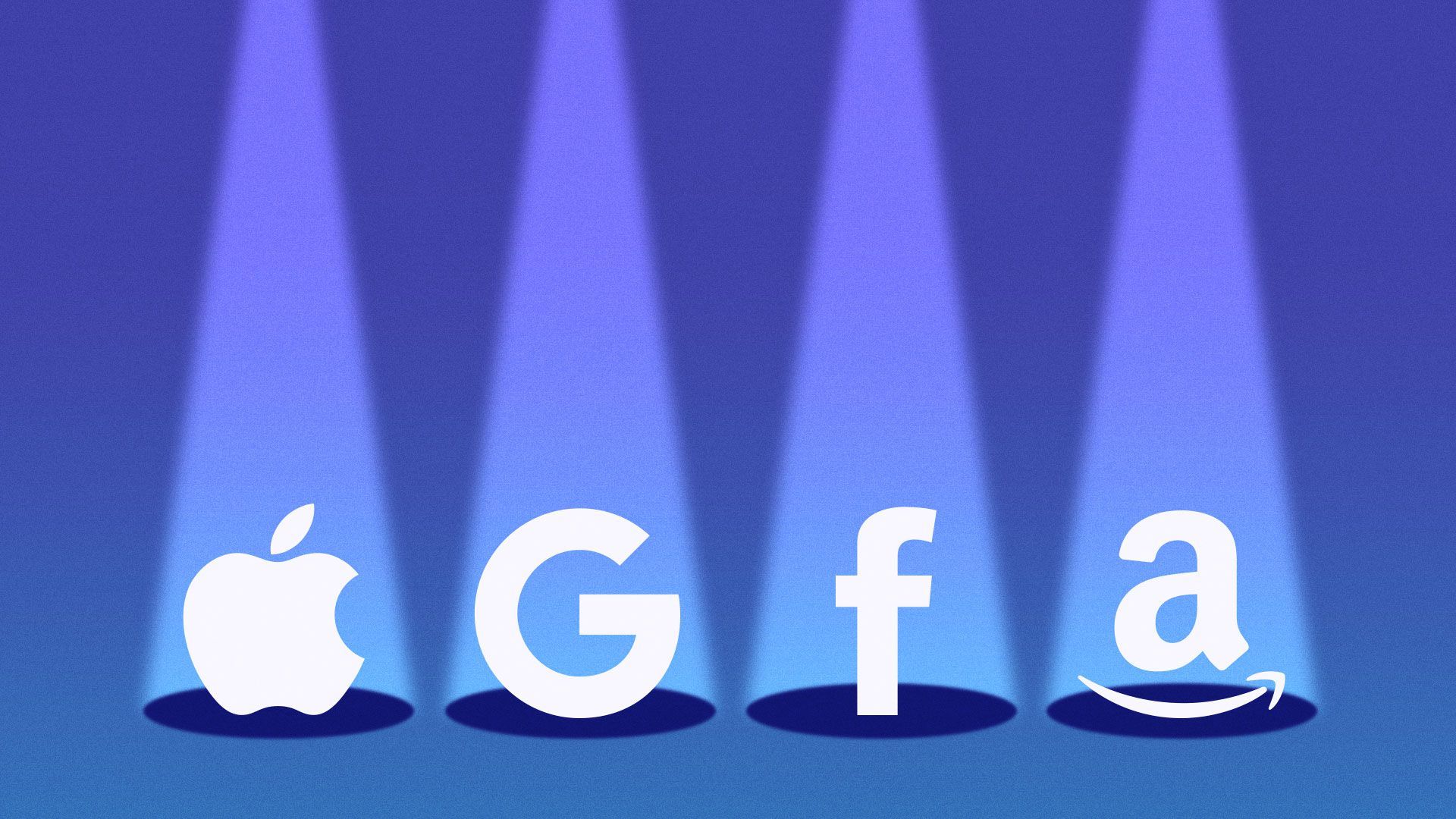House throws kitchen sink at tech CEOs
Add Axios as your preferred source to
see more of our stories on Google.

Illustration: Eniola Odetunde/Axios
House lawmakers aired an enormous array of grievances with the CEOs of Facebook, Google, Amazon and Apple Wednesday, throwing everything in their arsenal at four of the most powerful men in the world for six hours.
Quick take: The antitrust hearing didn't nail a case that these companies are harmful monopolies. But the representatives succeeded in wringing some surprising admissions from the executives about how they wield their market power, providing ammunition for regulators now conducting investigations — and possibly a spur for Congress to strengthen antitrust law for the digital era.
The big picture: Here's where the House Judiciary antitrust subcommittee pressed each company hardest.
- Facebook: Panel Democrats said the social network's acquisitions of Instagram and WhatsApp were plainly anticompetitive — that the company made the deals to stop Instagram from becoming a competitor to its main platform and WhatsApp from becoming a competitor to its messaging service. (CEO Mark Zuckerberg said Facebook had no idea the two would become such juggernauts when it bought them.)
- Google: Lawmakers homed in on the company's acquisition of DoubleClick in 2007 as the watershed moment when its dominance of search combined with power over the levers of online ad targeting.
- Amazon faced tough questions about its role as both a massively successful online retailer and the proprietor of the biggest online marketplace for third-party sellers.
- Apple took sustained heat for its power over the iPhone's App Store and the cut it takes from developers who sell digital products through their apps.
- All the companies, subcommittee chair David Cicilline said, have become bottlenecks for distribution, using their chokehold over data to surveil potential competitors and their control over technologies to extend their power.
Yes, but: The CEOs dodged most of the bullets aimed at them. Amazon's Jeff Bezos, testifying for the first time before Congress, sustained the most damage.
- Asked if Amazon has ever broken its rule against tapping specific third-party seller data to develop its own competing products, Bezos said he couldn't rule it out. He also acknowledged that the "aggregate data" Amazon does allow its employees to examine can come from as few as two or three marketplace sellers.
- Asked if Amazon used data from companies that use its AWS cloud unit to develop competing products, Bezos first said he wasn't aware of the company doing so and then acknowledged it may learn things about AWS clients that it uses in product development.
The catch: Lawmakers repeatedly cited instances where the companies acted ruthlessly, but antitrust laws don't bar ruthless competition unless you're a proven monopolist.
- Each of these companies wields enormous power. But antitrust enforcers at the Justice Department and the Federal Trade Commission won't be able to use the evidence the committee assembled to build an antitrust case unless they can also define markets and prove that these companies dominate them.
- The antitrust panel did little on that front Wednesday. They raised no objections, for instance, as Zuckerberg and Apple's Tim Cook cited examples of intense competition they face in various lines of business.
- They spent more time drilling down on the methods Facebook, Amazon and others used to develop copycat versions of other firms' products and apps.
Between the lines: Zuckerberg was quick to note that regulators at the time raised no objection to Facebook's acquisitions. That argument only underscored the deeper unspoken assumption behind the Democrats' attack.
- Our existing system brought us to this point, they seemed to say, where a handful of private companies dictate the terms of how people talk, consume, work and play online. Time to change that system.
The other side: Panel Democrats like Reps. Pramila Jayapal, Joe Neguse and antitrust subcommittee chairman David Cicilline drove tough lines of evidence-based inquiry, and a couple of their Republican counterparts joined in. But most of the GOP representatives used their time to repeat the litany of charges of anti-conservative bias that they have been pressing in the Capitol for two years.
- Rep. Jim Jordan (R-Ohio) said "Big tech is out to get conservatives" and pressed the CEOs one by one to denounce "cancel culture."
- Rep. Greg Steube (R-Fla.) spent several minutes needling Google CEO Sundar Pichai on why Gmail is filing his campaign emails to supporters' and family members' spam folders.
Our thought bubble: Republicans normally provide the "hands off business" side of the antitrust argument, but their obsession with bias and "censorship" charges left that perspective with few advocates in this debate.
